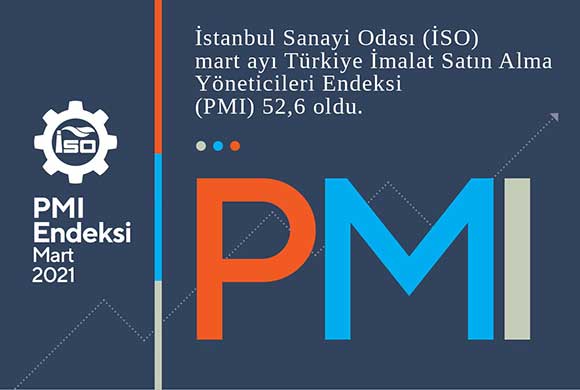News
March 2021 Report of ICI Türkiye Manufacturing PMI and Türkiye Sector PMI Released
- 01.04.2021
- News

Istanbul Chamber of Industry Türkiye Manufacturing PMI (Purchasing Managers’ Index), which is recognized as the fastest and reliable reference in manufacturing industry performance, the leading indicator of economic growth, increased to 52.6 in March, pointing to a strong improvement in the industry. The overall improvement in operating conditions was recorded for the 10th successive month. Total new orders increased in March despite the slowdown in the previous month, going back to the growth zone.
According to Istanbul Chamber of Industry Türkiye Sector PMI's for March, most of the ten sectors posted expansion in output, led by basic metals. Only three sectors saw increase in new orders. All sectors except for the wood and paper products and clothing and leather products expanded staffing. Disruptions in the supply chain continued to be the common problem of all sectors. Difficulties in accessing raw materials and the weakness of the Turkish Lira led to the rise of inflationary pressures. All of the sectors posted strong increases in input costs.
The March 2021 period of Istanbul Chamber of Industry (ISO) Türkiye Manufacturing PMI (Purchasing Managers’ Index) survey, which is recognized as the fastest and reliable reference in manufacturing industry, the leading indicator of economic growth, was announced. According to the results of the survey, where any greater than the threshold value of 50.0 indicates overall improvement of the sector, the headline PMI rose to 52.6 in March, from 51.7 in February, signalling a strong improvement in the performance of the sector. This was the tenth successive month of the strengthening of the operation conditions.
Total new orders increased in March despite the slowdown in the previous month, going back to the growth zone. Survey respondents reported signals of improvement in demand. New export orders increased for the third successive month running, recording a bigger growth than total new orders. Rise in new orders and inclusion of new production lines played a role in the output growth for the third successive month. Although the growth rate showed a slight increase, some of the survey respondents reported that disruptions of raw material supply prevented a higher rate of increase. Continued sharp increase in suppliers' lead times pointed to difficulties on the supply side. Drawbacks in global freight transportation led to further shortages in raw material supply, pushing lead times upwards at a higher rate than in February. While supply shortages also increased inflationary pressures in March, the depreciation of the Turkish lira played a role in seeing the fastest increase in input costs since the beginning of the year.
Similarly, after the inflation rate declined to its lowest level in the last 10 months in February, finished product prices saw the fastest increase since December. Turkish manufacturers continued to strongly increase their numbers of staff in March. Thus, employment has increased steadily over the last 10 months. Investments, new production lines and the increase in output requirements were some of the factors that supported the increase in employment. Purchasing activities also saw recovery after the slight slowdown recorded in February. However, difficulties in sourcing raw materials weakened the efforts to increase input stocks, which recorded the fastest decline in the past three months.
Commenting on the Istanbul Chamber of Industry Türkiye Manufacturing PMI survey, Andrew Harker, Economics Director, IHS Markit, said: “Turkish manufacturing sector managed to bring back its new orders to the growth zone in March despite some serious challenges it faced, and it continued to increase both output and employment. Raw material supply difficulties, which have recently become even more evident, affected suppliers' lead terms, stocks and input costs, but limited output growth at the same time. In addition, the depreciation of the Turkish lira exacerbated inflationary pressures. Firms will be hoping that some of these challenges will ease in the coming months so that growth in the sector can begin to accelerate.”
Most sectors saw expansion in output
According to Istanbul Chamber of Industry Türkiye Sector PMI's for March, output growth was seen in most of the sectors, but overall new order volumes mostly stayed stable and firms continued to face difficulties in material procurement. Meanwhile, there were signals of acceleration in the inflation.
6 out of the 10 sectors posted and expansion in output in March, indicating an improvement compared to February, when only four sectors expanded. As in the first two months of the year, the fastest expansion in output was in the basic metals sector in March. It also drew attention that the food products and clothing and leather products sectors returned to their growth zone. On the new orders side, where a weaker status is observed, only three sectors experienced growth.
In the clothing and leather products sector, new orders increased for the first time in more than a year, led by the rapid rise in new export orders. Employment continued to be the area with the most positive developments in the last survey. All sectors except the wood and paper products and the clothing and leather products sectors expanded staffing in March. The highest increase in employment was recorded in the electronic & electrical equipment sector. Supply chain disruptions continued to be the common problem of all sectors. The most visible delays in deliveries were recorded in the basic metals and machinery and metal products sectors. Difficulties in accessing raw materials and the weakness of the Turkish Lira led to the rise of inflationary pressures. All 10 sectors reported strong increases in input costs during March, and inflation in the majority of the sectors was higher than in February. The difficulties in raw materials also affected the stocks. While stocks of finished products decreased in all ten sectors, input stocks increased in only two sectors.